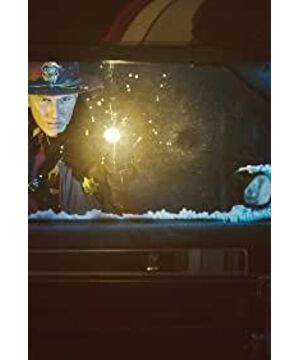Please follow us through the QR code
. That is the boulder that our men will push
by Shan Tong Xingtu
|From the Internet
on the second season of "Frozen", we must tell a mythical story first.
Sisyphus is a figure in Greek mythology. He offended the gods, and in order to punish him, he asked him to push a boulder to the top of the mountain. But because the boulder was too heavy, it often rolled down the mountain before reaching the top of the mountain, and all previous efforts were lost. And so he did it over and over again—and the gods thought there was no more severe punishment than this futile and hopeless labor. Sisyphus doesn't die, so pushing the boulder will never end.
Very hopeless story. But when I heard it for the first time, I was surprised and thought it was a little cool. Years later, in the second season of "Frozen", this idea coincides. At the end of the story, Lou drove back to Minnesota with Peggy, who was still stubborn after the disaster, and returned to the beginning of the story
. A burden, but it is actually our honor.
As a work with 100% tomato degree and top ten lists, there are too many things in the second season of "Fargo" worth analyzing. Aliens have watched indifferently for thousands of years. Indians have been immortal in various ways. The old sheriff tried to use graphics instead of language to communicate. Black people are like sages, but after all, they are pawns in the game of money. When a drama rises to a certain level, everyone is the protagonist. "Fargo" deservedly conquered me with the cold Minnesota, and it inadvertently, solemnly and indifferently told people: there is no meaning, meaning has been dissolved.
In order to avoid stepping into symbolism, "Fargo" starts from the fifth episode, and slowly surfaced the carrier of meaning: the American dream. The title of the fifth episode is: The Gift of the Magi, a warm and ironic classic proposition. Maggie relied on money from cheap car sales to support Ed's opening a butcher's shop, but Ed burned the butcher's shop in self-defense. Before Ed entered the back kitchen operation room, Noreen, a strange little girl who read all day, had a meaningful conversation with him.
Ed will buy the butcher shop and the American Dream painting, but the little girl said:
Camus said, knowing that you are mortal, life can laugh it off.
▽ I will live a long time.
Although the whole play does not give a close-up shot of the book Wei Xiaomei reads all day long, I can guess with my feet that she must be reading Camus' philosophical essay "The Myth of Sisyphus". Ed immediately retorted, saying that he would live a long, long time, and for example, his grandfather lived to be 96 years old.
Ed said this without feeling inconsistent. He's like a big brown bear with his stomach cut open and his intestines stuffed back as usual. The knife head licks blood, wild and tenacious. But he died ironically in the end, not under the pursuit of the Harent family, not under the bullets of the Indians, but at the hands of his stupid but self-righteous wife Peggy. If there is one person on the show who is Sisyphus, he is. It's just that Ed was not as lucky as Sisyphus and was killed by a falling stone.
That fire destroyed Ed's American Dream and was the beginning of his forced "rock push". Surrounded by strong enemies, he had to take his wife to the end of the world. At the last moment of the escape, Ed was dying, and a dialogue with the strange girl emerged in his mind. Although he revealed it unconsciously, he was aware of the problem from ordinary emotions and identified with Camus. So he said to Peggy:
You always try to fix everything, but sometimes nothing breaks at all.
▽You always want to fix everything.
By the way, after the performance of "Fargo", the little fat Ed went to play Spielberg's "Bridge of Spies". Although he is a supporting role, he really hopes to develop into the second cute!
Many people know about the myth of Sisyphus because of Camus. Because he pushed the tragedy forward, straight to the depths of human nature, and tortured the value/meaning of existence. As the so-called tragedy is to destroy valuable things for people to see, "Fargo" destroys the American dream, and destroys the memory of human beings in the process of progress, ignoring the price they need to pay. Translated into today's chicken soup words: behind the bright and beautiful, there are often times of bitterness.
The American Dream has always been heavy. (If you count the recent shootings, it's more than that...)
In the process of our dreams, we often breed the wet side of greed, selfishness, and deceit. That's life, just as it's impossible for a wheel to go over muddy ground without getting mud. So, even if Ed had such a cheating wife, he had to recognize it. By the way, "Fargo" is different from other dramas in that the characters do not grow. The Harrant family didn't know the law because of this incident, so the whole family died; Peggy was still the stupid woman who longed for the prosperous life of the metropolis and was successfully brainwashed. At the last moment of Eddie's life, she blindly thought that everything would be alright, and that as long as the words "I love you" could overcome everything. She fantasizes about the "last minute rescue" in the TV series happening in her life, and she fantasizes that she can finally get rid of everything and go to live in a big city. Peggy is just like a member of a pyramid selling organization in a fifth-tier city. It's not sad. It's just that in the case of unequal information, the dream has become an exhibition in a glass zoo, fragile and foamy.
But I don't think Ed will hate Peggy for that. He was just tired, so he quit halfway through the long break. As said above: that's the boulder we men push, and we don't have a choice. When Peggy bumps into the punk and takes him home to deal with, Ed has to show the cold side of humanity. This is also the cold side of life, for better or worse you have to keep going. Life will blindfold you and drag you forward. When you think that you are about to reach the set goal in your heart, you may just turn a corner. Life is that boulder that we have to keep pushing, hoping one day to end this slavery.
But that's not enough.
If I had to say what was left in Fargo, Detective Lu's family had the best answer: We fight side by side with those we love. As a policeman full of justice and boyfriend strength, Lu's confusion comes from "why a good man is not rewarded" and why a kind wife suffers from the damn lymphoma. In that era of underdeveloped medicine, this was tantamount to an early sentence of death. In the fifth episode, Lou has a hesitant conversation with then-governor Ronald Reagan in the bathroom. Excluding the plot of Heligan, this can be regarded as a picture of a helpless person going to a temple to seek Buddha. I tell my heart, you are silent.
God's script is played by man. So God, which page is my doom written on?
This is the meaning of life. Things are unpredictable, we don't know which plane in the sky is going to fall, we don't know which car has a crazy driver in it. No matter how bloody and great we are, it’s just a plot with two pages more than others, and we still can’t escape the applause. However, there is nothing wrong with loving someone, as big as going through fire and water for him, or as small as saying good night to him. There is no shortage of warriors in the battle of life, but the courage to shoulder it together.
This is not a burden, but our pleasure.
▽ We call it a burden.
Finally, I want to talk a little more about the image of Indians in Fargo. This open-minded young man regards life as a mustard and kills like a dog. I wasn't at all surprised when he shot Dodd in episode 9, he's a true Aboriginal after all, not an adopted pet. As a character who seems to be closely related to the plot, but is actually outside, the Indians are like a lone wolf, with the innate power of life and death and the vitality of death. This abounds in American films. For example, in One Flew Over the Cuckoo's Nest, the big Indian suffocated the male protagonist who had had his frontal lobes removed, smashed the glass, and fled into the forest. He just destroyed the controlled body, but inherited the male protagonist's spirit of rebellion and resistance. This is the reverence and respect that Americans have for the source. Although their world image is white skin, blonde hair and high cheekbones, they know that the owner of this land belongs to the Indians. Otherwise, how could the great work "The Revenant" be born.
At the end of the film, the Indians got a new identity, reborn, and decided to hunt down the Kansas gangsters. To be honest, I quite like this character, despite his cruel methods and disregard for etiquette. But this terrifying totem of vitality is so convincing, and the talents that cannot be bought are the most fascinating. There are too many injustices in the world, and it always requires some black and white impermanence, a straight face, and murder in a dream.
View more about Waiting for Dutch reviews











